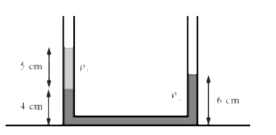Equal masses of two substance of densities ρ1andρ2 are mixed together. What is the density of the mixture?
d1+d22
d1+d2d1d2
d1d2d1+d2
2d1d2d1+d2
To find the density of a mixture of two substances with equal masses and different densities, we can follow these steps:
1. Define the Masses and Densities:
- Let the mass of each substance be M.
- Let the densities of the two substances be ρ1 and ρ2.
2. Calculate the Volumes of Each Substance:
- The volume of the first substance V1 can be calculated using the formula:
V1=Mρ1
- The volume of the second substance V2 is given by:
V2=Mρ2
3. Calculate the Total Volume of the Mixture:
- The total volume V of the mixture is the sum of the volumes of the two substances:
V=V1+V2=Mρ1+Mρ2
4. Calculate the Total Mass of the Mixture:
- The total mass Mtotal of the mixture is:
Mtotal=M+M=2M
5. Calculate the Density of the Mixture:
- The density ρ of the mixture is defined as the total mass divided by the total volume:
ρ=MtotalV=2MMρ1+Mρ2
- Simplifying this expression, we can factor out M:
ρ=2MM(1ρ1+1ρ2)=21ρ1+1ρ2
6. Finding a Common Denominator:
- To simplify further, we can find a common denominator for the fractions in the denominator:
1ρ1+1ρ2=ρ2+ρ1ρ1ρ2
- Thus, we rewrite the density of the mixture:
ρ=2ρ2+ρ1ρ1ρ2=2ρ1ρ2ρ1+ρ2
Final Result:
The density of the mixture is given by:
ρ=2ρ1ρ2ρ1+ρ2
- Let the mass of each substance be M.
- Let the densities of the two substances be ρ1 and ρ2.
- The volume of the first substance V1 can be calculated using the formula:
V1=Mρ1
- The volume of the second substance V2 is given by:
V2=Mρ2
- The total volume V of the mixture is the sum of the volumes of the two substances:
V=V1+V2=Mρ1+Mρ2
- The total mass Mtotal of the mixture is:
Mtotal=M+M=2M
- The density ρ of the mixture is defined as the total mass divided by the total volume:
ρ=MtotalV=2MMρ1+Mρ2
- Simplifying this expression, we can factor out M:
ρ=2MM(1ρ1+1ρ2)=21ρ1+1ρ2
- To simplify further, we can find a common denominator for the fractions in the denominator:
1ρ1+1ρ2=ρ2+ρ1ρ1ρ2
- Thus, we rewrite the density of the mixture:
ρ=2ρ2+ρ1ρ1ρ2=2ρ1ρ2ρ1+ρ2
The density of the mixture is given by:
ρ=2ρ1ρ2ρ1+ρ2
Similar Questions
If equal masses of two liquids of densities d1andd2 are mixed together, the density of the mixture is
View SolutionTwo substances of densities ρ1 and ρ2 are mixed in equal volume and the relative density of mixture is 4. When they are mixed in equal masses, the relative density of the mixture is 3. the values of ρ1 and ρ2 are:
View SolutionIf two liquids of same volume but different densities ρ1 and ρ2 are mixed, then the density of the mixture is:
View SolutionIf two liquids of same mass but densities ρ1 and ρ2 respectively are mixed, then the density of the mixture is:
View SolutionA narrow U-tube placed on a horizontal surface contains two liquids of densities ρ1 and ρ2 . The columns of the liquids are indicated in the figure. The ratio ρ1ρ2 is equal to :

View SolutionEqual masses of water and a liquid of density 2g/cm3 are mixed together. The density of mixture is:
View SolutionTwo liquids of densities 2ρ and ρ having their volumes in the ratio 3:2 are mixed together. Density of the mixture will be
View SolutionEqual volumes of three liquids of densities ρ1,ρ2 and ρ3, specific heat capacities c1,c2 and c3 and temperatures t1,t2 and t3, respectively are mixed together. What is the temperature of the mixture? Assume no changes in volume on mixing.
View SolutionWhen two substances of specific gravities d1 and d2 are mixed in equal volumes the specific garvity of mixture is found to be ρ1. When they are mixed in equal masses, the specific gravity of the mixture is found to be ρ2.(d1≠d2)
View SolutionTwo discs have same mass and thickness. Their materials are of densities ρ1 and ρ2. The ratio of their moment of inertia about central axis will be
View Solution
